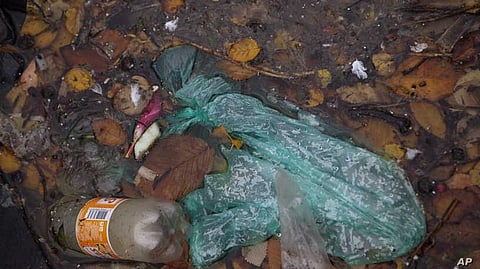
- Home
- NewsGram USA
- India
- न्यूजग्राम
- World
- Politics
- Opinion
- Entertainment
- On Ground
- Culture
- Lifestyle
- Economy
- Sports
- Sp. Coverage
- Misc.
- NewsGram Exclusive
- Jobs / Internships
- Interview

By Zlatica Hoke
German scientists say they have identified a strain of bacteria that is feeding on polyurethanes, a plastic resistant to biodegradation. This is an environment news.
A team of researchers at the Helmholtz Center for Environmental Research in Leipzig, Germany, has found that a strain of soil bacterium, identified as Pseudomonas putida, can produce enzymes to digest polyurethanes thus making it biodegradable.
Please follow NewsGram on Twitter to get updates on the latest news
The German team says the bacterium found in the soil surrounding a heap of polyurethane waste was feeding on polyurethane diol, which is used in plastic as a component that protects products from corrosion.
A worker sorts through recycling bins at a centre that offers residents money in exchange of their recyclable garbage in an attempt to keep the streets clean in Cairo, Egypt. VOA
Hermann Heipieper, one of the researchers and author of the study published in the journal Frontiers in Microbiology, said "this finding represents an important step in being able to reuse hard-to-recycle (polyurethane) products."
The study offers hope of ridding the planet of the growing quantities of discarded plastics' products that threaten human and animal life. But some scientists are skeptical.
In earlier experiments, biodegradation of some plastics components was achieved with fungi. Yale University students in 2011 discovered a fungus that can digest and break down polyurethane plastic even in a place without air – like the bottom of a landfill. Since then scientists around the world have identified other fungal species that can breakdown polyurethane. In 2017, a team of scientists identified another fungus that can feed on plastic by breaking down chemicals that hold it together.
These studies also raised concerns about the ability of micro-organisms to invade and corrupt a dead and therefore sterile substance like plastic. Research on coral reefs has shown that floating plastics carry disease-causing microbes that infect the coral.
The Leipzig study says bacteria are much easier to control and produce for industrial use. Its authors say the next step is to identify the gene code of the enzymes produced by the bacteria to digest polyurethane.
Some scientists are arguing against introducing man-made enzymes or potentially dangerous micro-organisms into the natural environment.
Two years ago, scientist Douglas Rader wrote in an op-ed for the Environmental Defense Fund that "There is so much more we need to understand about the complex relationships between plastics and marine ecosystems before we can take drastic action such as spraying the ocean with so-called plastic-eating bacteria."
Workers load collected plastic bottles on to a truck at a junk shop in Manila. VOA
Despite new findings, science is nowhere near solving the growing plastics pollution problem. Humankind has manufactured and discarded so much plastics over the years that the world is getting short of places to dump the enormous quantities accumulated every day. Refusal by many developing countries to accept plastic waste from rich nations has exacerbated the problem.
Please follow NewsGram on Instagram to get updates on the latest news
Some countries are cutting down on the use of plastics bags, drinking straws, bottles and utensils. Scientists keep coming up with new biodegradable products to replace plastic, such as wrapping materials made from algae, straws made of paper and disposable utensils made of bamboo, but the movement could be described as "too little too late." Recycling the plastics to make building materials, fabrics, and other new plastic products cannot even make a dent in the growing amounts of plastics waste.
Plastic remains the most practical packaging material and is indispensable in medical, pharmaceutical, sanitary and many other industries. Some new biodegradable, but equally useful material, has yet to be developed.
Meanwhile scientists estimate that about 8 million pieces of plastics enter the oceans every day. For some of them it will take hundreds of years to properly degrade if they are not first swallowed by fish and other marine creatures that will die from it. (VOA)
